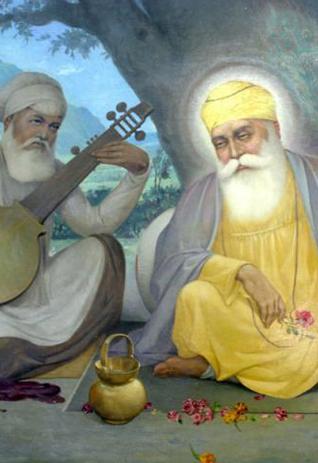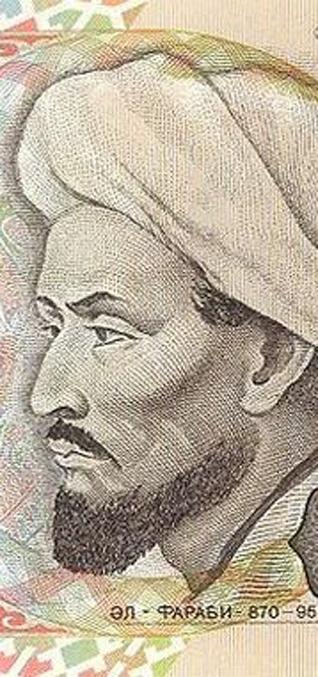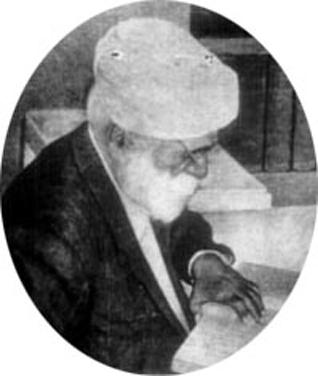
Above: Guru Nanak, with Mardana on the rabab. Below, first from bottom - the author, Dr. Balbir Singh. Second from below: Al Farabi of Baghdad.


Music
The Bard Divine
by Dr. BALBIR SINGH, Translated from Punjabi & Edited by SANGAT SINGH
bhalo bhalo ray keertani-aa ... the bard divine
A millennium ago there lived in Baghdad a genius called Abdul Nasser Farabi - a great philosopher and a musician. He led a simple life and cared not for material wealth. He was much sought after.
A wealthy patron of fine arts who had heard much of Al Farabi’s accomplishments was keen to meet him. He sent many invitations but failed to evoke any response.
Then one day, Farabi barged into the rich man’s home where a party was in progress. The celebrated musician was in tattered clothes, his hair disheveled, so that everyone took him for a beggar. The master of the house vented his anger on the gate-keeper for letting such a wretch into the house.
While the guests were making fun of Farabi, he took his instrument and played a tune which sent the whole company into a fit of uncontrolled laughter. Then he changed the key and played another tune, and the company started to sob uncontrollably. Yet he changed another tune, and this time everyone went into a deep slumber.
He then wrote the following message and left the house:
‘You were desirous of meeting Farabi. He came. But you made fun of him. Nevertheless he entertained you with his musical skill and now he has left’.
Five centuries later, the same metropolis of Baghdad witnessed the musical skill of a master divine musician. His name was Nanak.
He had something more.
Farabi had only three keys, Nanak had a fourth one - a master key which transported the slumbering audiences to the ethereal regions of ineffable bliss and quietude.
ahinis sunn samadhi samaavai
“Day and night he remains absorbed, deep in meditation” [GGS:877.16]
Describing Guru Nanak’s visit to Baghdad, Bhai Gurdas wrote how his divine song had an electric effect on the residents of the city where music had been banned. When Pir Dastgir, the contemporary Muslim saint, heard Guru Nanak sing to the accompaniment of Mardana's rabab, he was reminded of what Simoon Mohib, one of his own ancesters, had said about music:
“Music is a call from God to souls, and ecstasy is the answer of the souls merging in God”
This was the fourth key which Guru Nanak had that Farabi lacked. Guru Nanak’s rabab had a wider keyboard that produced tunes unheard before. His songs were tuned to divine harmony that made the human spirit rise above mundane earthly existence and allowed it to roam in the regions of the celestial. His prelude, interlude and close were not merely a skilful succession of notes. His song had a super-terrestrial quality, a cosmic reach which attuned the human spirit to the Infinite and made it soar above the stars:
sabad anaahad so saho raataa naanak kahai vichaara
“Says Nanak the meek, that the Lord is absorbed in the music of the celestial heavens” [GGS:351.6]
This was Guru Nanak’s personal description: the universe set in motion in a tuneful rhythm! In countless galaxies, the planets move around the stars at constant and inflexible speed, producing harmony which is as ineffable as it is eternal.
Guru Nanak’s rabab was in tune with what he saw and was a reflection of the cosmic rhythm. Without it, the instrument is no more than a hollow contraption producing discordant notes:
hath kar tant vajaavai Jogee thothar vaajai bayn [GSS 368.1]
Guru Nanak was a poet, a singer and a musician. He called himself a ‘dhaadhi’ but was a minstrel divine commissioned by the Lord of creation Himself:
ha-o dhaado hee vaykaar kaarai laa-i-aa
dhadhee sachai mahal khasam bulaa-i-aa
dhadee karay pass-o sabad vajaa-i-aa”
I, the worthless bard, the Master has taken into His service. The Master called the bard into His presence and commissioned him to sing His praises.” [GGS:150.19]
Such was Guru Nanak who through his sublime symphonies of song and music healed the tormented souls of sinners, making preachers out of thugs and gods out of demons. It was the miraculous quality of his divine melody that immobilized the arms that had been swung to stone him to death for violating the commands of the shariat by bringing music to Bagdad. The mob that had gathered to punish him was petrified by the magic of his song.
How blessed we are to have Guru Nanak and his legacy for rendering into song the unutterable divine truths for all times to come.
February 1, 2012
Conversation about this article
1: Baldev Singh (Bradford, United Kingdom), February 01, 2012, 12:48 PM.
Music was banned in Baghdad 500 years ago! If you ban music, then you ban humanity.
2: Gurdip (New York, U.S.A.), February 01, 2012, 7:09 PM.
Music truly is a catalyst to connect to the divinity within us.
3: Jessie (Malaysia), February 02, 2012, 2:37 AM.
Music is the medium that can bring all humans together.
4: Manjeet Singh (Kuala Lumpur, Malaysia), February 03, 2012, 4:08 AM.
Here is the Bard Divine and his legacy for all mankind. The first to set an entire belief system to celestial music for the whole mankind to inherit. Music is centre-stage in Sikhism. Indeed Guru Nanak's very words had music in them. The word 'gaavey' (sing) or its derivations appear over and over again in gurbani. In pauri 27 of Japji, for example, Guru Nanak sees the whole cosmos singing His praises. Even the elements: 'gaavay pavan paani baisantar. ..' are engaged in the Divine Song. And where there is song, can music be far from it?


